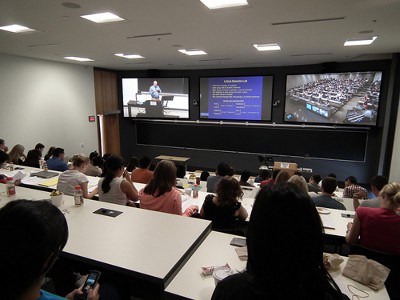
 Earlier this year, the government of Canada launched its Innovation Agenda, actively soliciting advice from the public on how to increase the country’s profile as world leader in innovation, including how to improve the role of the education system in raising the next generation of tech leaders.
Earlier this year, the government of Canada launched its Innovation Agenda, actively soliciting advice from the public on how to increase the country’s profile as world leader in innovation, including how to improve the role of the education system in raising the next generation of tech leaders.
But at least a couple of academics have raised a flag defending the role that the humanities and social sciences play in creating a more robust version of innovation than if every educational institution in the country were to sacrifice literature and the arts in order to simply teach everyone how to code or become engineers.
At a workshop called “Strengthening innovation through scholarship and community”, part of the Federation for the Humanities and Social Sciences 2016 annual conference at Hart House on the University of Toronto campus earlier this month, Dr. Richard Hawkins made the case for strengthening the humanities in an era during which education is being asked to justify its place in a society that increasingly values metrics like return-on-investment over meaningfully engaging citizens and enriching human lives, which is after all the reason that technology exists in the first place.
“What the government wants is more new things being invented in our engineering labs. They want us to take those things, patent them, form new technology companies, commercialize them and then have them hopefully turn into Apple or Microsoft,” said Hawkins.
Hawkins, former Canada Research Chair in the Social Context of Technology, is a professor in the University of Calgary’s department of communication, media and film.
“The main thing the government wants is the economy to diversify,” said Hawkins. “They want all of these immediate, practical benefits, and then they are hoping that all of these other kinds of things can accrue from that. So I think we have to start by making a case for ourselves in the relevance of the work that we do.”
Anyone who might dismiss the importance of the humanities towards fostering Canada’s next tech sector visionary might do well to remember that Slack CEO Stewart Butterfield studied philosophy at the University of Victoria, focusing in particular on the work of Baruch Spinoza, before going on to found one of the most hotly discussed and heavily financed start-up unicorns in the 21st century’s young history.
Butterfield was also obsessed with ’90s jam band Phish, participating heavily in the rec.music.phish online community, going to show that no one is perfect.
“Defined simply, innovation is the process of creating value from change,” reads the submission made in September by the Federation to the government’s Innovation Agenda.
In the government’s haste to diversify Canada’s economy away from the resource sector towards the “resourcefulness” sector, and to push for the creation of more companies like Shopify, Hootsuite, Vision Critical and Vidyard, it would be easy to forget the value of post-secondary education in creating well-rounded citizens with fully developed critical faculties in favour of just going along with the pressure put on universities to adjust their relationship with students to one that resembles a consumer-service provider type of transaction, rather than facilitating a free space for open-minded debate and the creation of meaning.
“We need a more complete understanding of innovation that includes research and insight from all disciplines,” wrote Federation president and Munk School of Global Affairs director Stephen Toope in a July 2016 article for the Hill Times. “To meet the challenges ahead, we’ll need help from a broad range of non-technological innovators, including designers, economists, business managers, political scientists, humanities researchers, psychologists, legal experts and artists.”
Discussing the potential for the government’s Innovation Agenda to get bogged down in partisan point-scoring and bureaucratic rhetoric, at least one of Hawkins’ co-presenters doesn’t sound hopeful.
“I started out in the spring being hugely optimistic about its potential and I have been ratcheting my expectations down steadily, and they are now pretty minimal,” said David Wolfe, University of Toronto Mississauga political science professor and co-director of the Innovation Policy Lab. “The government has created a very confusing and conflicted policy process for developing an innovation agenda. And that’s never a recipe for good policy.”
Leave a Reply
You must be logged in to post a comment.




 Share
Share Tweet
Tweet Share
Share




Comment